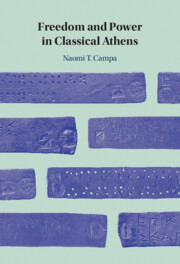Book contents
- Freedom and Power in Classical Athens
- Freedom and Power in Classical Athens
- Copyright page
- Dedication
- Contents
- Acknowledgments
- Conventions and Abbreviations
- Chapter 1 Introduction
- Chapter 2 Democratic Eleutheria as Positive Freedom
- Chapter 3 Oratorical Ambiguity
- Chapter 4 Power and the Citizen
- Chapter 5 The Powerless and Unfree
- Chapter 6 Conclusion
- Bibliography
- Index Locorum
- General Index
Chapter 1 - Introduction
Freedom, Power, and Athenian Democracy
Published online by Cambridge University Press: 04 April 2024
- Freedom and Power in Classical Athens
- Freedom and Power in Classical Athens
- Copyright page
- Dedication
- Contents
- Acknowledgments
- Conventions and Abbreviations
- Chapter 1 Introduction
- Chapter 2 Democratic Eleutheria as Positive Freedom
- Chapter 3 Oratorical Ambiguity
- Chapter 4 Power and the Citizen
- Chapter 5 The Powerless and Unfree
- Chapter 6 Conclusion
- Bibliography
- Index Locorum
- General Index
Summary
Chapter 1 sets out the main questions and contentions in the book. It explores the concept of freedom and identifies it as a central concept in Athenian democratic ideology in both the private and public spheres. Scholarly debates on the concept of freedom are outlined, with an especial emphasis on Isaiah Berlin’s notion of positive and negative freedom and its application to Athens in subsequent scholarship. Distinguishing democratic freedom from negative and republican versions, I argue that Athenians understood freedom as the ability to do “whatever one wished,” which I classify as a modified version of positive freedom. The focus on citizen agency in accomplishing his will differentiates Athenian democracy from other constitution types and affects its institutional features. The chapter closes with a brief overview of the rest of the chapters.
Keywords
- Type
- Chapter
- Information
- Freedom and Power in Classical Athens , pp. 1 - 17Publisher: Cambridge University PressPrint publication year: 2024

